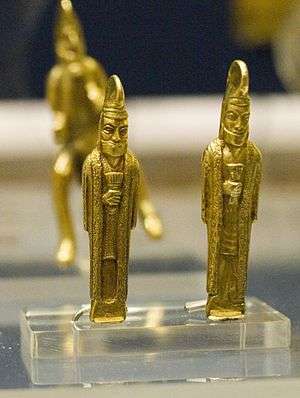Mobad
A mobed /ˈmoʊ'bɛd,-bæd/ or mobad (Middle Persian: 𐭬𐭢𐭥𐭯𐭲) is a Zoroastrian cleric of a particular rank. Unlike a herbad (ervad), a mobed is qualified to serve as celebrant priest at the Yasna ceremony. A mobed is also qualified to train other priests.

| Part of a series on |
| Zoroastrianism |
|---|
Atar (fire), a primary symbol of Zoroastrianism |
|
Primary topics |
|
Divine entities
|
|
Scripture and worship |
|
Accounts and legends |
|
Related topics |
|
|
In general (lay) use, the term is also used as an honorific to denote any priest, of any rank. For instance, Hormizd I appointed Kartir moabadan-moabad, which is frequently translated as "priest of priests", but more precisely indicates "high priest of high priests".
The term "mobed" is a contraction of Middle Persian magu-pati, the first half of the expression apparently deriving from Avestan 𐬨𐬀𐬔𐬀 maga- or magu- (of uncertain meaning), and with Avestan 𐬞𐬀𐬌𐬙𐬌 -paiti meaning "master" or "teacher". Through Old Persian 𐎶𐎦𐏁 magush and Ancient Greek μάγος magos, Old Iranian magu- is also identified as the origin of the Latin word magus, a "magian". Through the Greek adjective μαγικός magikos and Old French magique, 'mobed' is distantly related to the English language word "magic".
Zoroastrian priests in India are required to be male,[1] but women have been ordained in Iran and North America as a mobedyar, meaning an assistant mobed.[2][3]
References
- Nigosian, Solomon Alexander (1993), The Zoroastrian Faith: Tradition and Modern Research, Montreal, Quebec: McGill-Queen's University Press, p. 104, ISBN 077351144X, OCLC 243566889
- Wadia, Arzan Sam (March 9, 2011), "The Jury Is Still Out On Women as Parsi Priests", parsikhabar.net, Parsi Khabar
- Khosraviani, Mahshad (June 19, 2013), "Sedreh Pooshi by Female Mobedyar in Toronto-Canada", parsinews.net, Parsi News, archived from the original on October 9, 2014, retrieved October 10, 2014
Sources
- Boyce, Mary (2001) [1979], Zoroastrians, their religious beliefs and practices, London: Routledge, ISBN 0415239028, OCLC 45438877